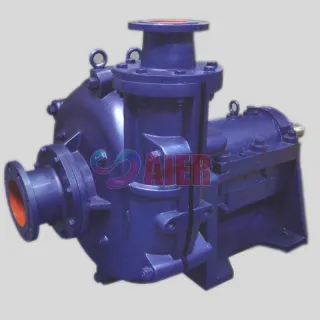සැප්. . 12, 2024 01:47 Back to list
Wastewater Treatment Centrifugal Pumps - Efficient Solutions for Waste Management
The Role of Centrifugal Pumps in Wastewater Treatment
Wastewater treatment is a critical aspect of environmental management, aimed at purifying used water before it is released back into natural water bodies or reused for various purposes. One of the fundamental components in wastewater treatment facilities is the centrifugal pump. This article explores the significance, functionality, and benefits of centrifugal pumps within the wastewater treatment process.
The Role of Centrifugal Pumps in Wastewater Treatment
One of the primary functions of centrifugal pumps in wastewater treatment plants is the movement of wastewater from one stage of the treatment process to another. For example, these pumps are integral during the initial stages, where raw sewage is collected and transported to preliminary treatment units. Effective transport is crucial because it helps in the continuous flow of the treatment process, ensuring that no bottlenecks occur, which could lead to system inefficiencies or backups.
wastewater treatment centrifugal pump

Moreover, centrifugal pumps play a pivotal role in maintaining optimal flow rates in biological treatment processes. In aeration basins, for instance, precise control over the flow of wastewater is essential to promote the growth of aerobic microorganisms that break down organic matter. Centrifugal pumps ensure that these systems operate effectively by providing consistent flow and pressure, contributing to the overall efficacy of the treatment plant.
The versatility of centrifugal pumps allows them to handle varying flow rates and pressures, making them suitable for different wastewater treatment applications, including sludge handling and dewatering. In the post-treatment phase, for instance, centrifugal pumps can be used to pump treated effluent for reuse or discharge into natural water bodies. They are also employed in the transportation of sludge, which is a byproduct of the treatment process, to digesters or dewatering systems.
In addition to their functional advantages, centrifugal pumps are often favored for their cost-effectiveness and low maintenance requirements. With advances in technology, many modern centrifugal pumps are designed to be energy-efficient, thereby reducing operational costs in wastewater treatment facilities. This efficiency not only benefits the facility’s bottom line but also promotes sustainability, as reduced energy consumption translates to a smaller environmental footprint.
In conclusion, centrifugal pumps are an indispensable component of wastewater treatment processes. Their ability to efficiently transport and control the flow of wastewater contributes significantly to the effectiveness and reliability of treatment operations. As the world focuses more on sustainable practices and the efficient management of water resources, the role of centrifugal pumps in enhancing wastewater treatment systems cannot be overstated. With continued innovations in pump technology, we can expect these vital machines to become even more effective in safeguarding our water resources for future generations.
-
Top Submersible Pump Companies High Quality Manufacturers & Suppliers in China
NewsJul.08,2025
-
High Quality Seal for 5 Inch Dredge Pump Reliable China Manufacturer & Supplier
NewsJul.08,2025
-
High-Efficiency Slurry Sand Pump from Leading China Manufacturer – Durable & Reliable Solutions
NewsJul.07,2025
-
High-Quality Slurry Pump Made in China Durable Steel Mill Slurry Pump & Parts
NewsJul.07,2025
-
High Quality Excavator Dredge Pump Manufacturer & Suppliers from China – Reliable, Durable, Efficient Solutions
NewsJul.07,2025
-
Wholesale Slurry Pump Closed Impeller Supplier High Efficiency China Slurry Pump Closed Impeller
NewsJul.06,2025
